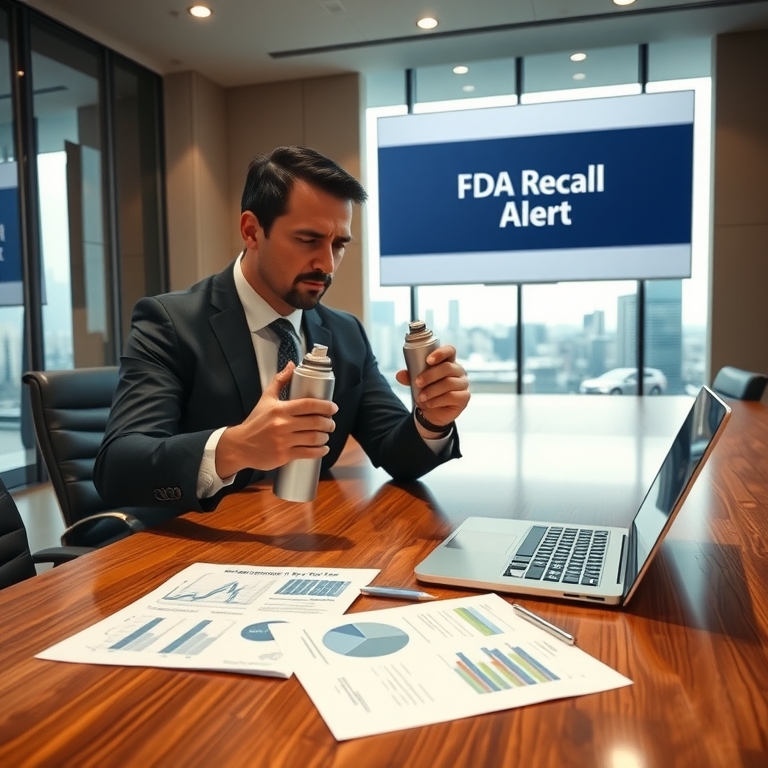In a surprising move that underscores the necessity for rigorous safety standards in consumer products, the U.S. Food and Drug Administration (FDA) has announced a recall of several deodorant brands found to contain potentially harmful chemicals. This decision, which has reverberated across the personal care industry, raises crucial questions about product safety, regulatory oversight, and the responsibility of manufacturers to ensure their products are safe for consumers.
The recall comes in the wake of an intensive investigation by the FDA, prompted by reports and studies suggesting that certain deodorant products contained chemical compounds that could pose health risks. These chemicals, often used as preservatives or fragrances, have been linked to various adverse health effects, ranging from skin irritations and allergic reactions to more serious concerns like endocrine disruption and potential carcinogenicity. The FDA’s decisive action reflects its commitment to safeguarding public health, especially in a sector where products are used daily by millions of consumers.
For the brands involved, this recall represents not only a significant logistical challenge but also a potential reputational crisis. The affected companies are now tasked with swiftly removing the products from shelves, managing consumer inquiries, and addressing the financial implications of the recall. Moreover, they must navigate the delicate balance of maintaining consumer trust while transparently communicating the steps they are taking to rectify the situation. In an era where corporate responsibility and transparency are increasingly demanded by consumers, the way these companies handle this crisis could have lasting impacts on their brand loyalty and market position.
The recall has also reignited the ongoing debate about regulatory oversight in the personal care industry. Critics have long argued that the sector is inadequately regulated, with many products reaching the market without rigorous pre-market safety testing. Unlike pharmaceuticals, which undergo extensive testing before approval, personal care products do not require pre-market approval by the FDA. Instead, the responsibility largely falls on manufacturers to ensure their products are safe. This case highlights the potential pitfalls of this regulatory framework and may spur calls for more stringent testing and oversight.
In response to the recall, industry experts and consumer advocacy groups are urging for more comprehensive safety evaluations and tighter regulations. They argue that greater transparency in ingredient disclosures and more robust safety assessments could prevent such issues from arising in the future. These advocates emphasize the need for a collaborative effort between regulatory bodies, manufacturers, and independent researchers to establish clearer safety standards and more effective monitoring systems.
For consumers, the recall serves as a stark reminder to remain vigilant about the products they use daily. It underscores the importance of being informed about product ingredients and understanding potential risks associated with chemical exposure. As consumers become more health-conscious and demand safer, more natural products, companies may feel increased pressure to reformulate their offerings and prioritize safety in their product development processes.
The recall also presents an opportunity for innovation within the industry. As companies work to address the safety concerns raised by this incident, there may be a shift towards more natural and organic formulations. This trend could foster a new wave of product development focused on minimizing chemical exposure while maintaining efficacy. For companies willing to embrace this challenge, there is potential to capture a growing segment of health-conscious consumers eager for safer alternatives.
In the days following the FDA’s announcement, market analysts have been closely monitoring the impact on the stock performance of the affected companies. Initial reactions have shown a dip in share prices, reflecting investor concerns over potential financial repercussions and long-term brand damage. However, some analysts suggest that companies that handle the recall effectively and demonstrate a commitment to consumer safety may be able to recover and even strengthen their market position in the long run.
As the recall progresses, it will be crucial for all stakeholders involved—the FDA, manufacturers, and consumers—to engage in an open dialogue about product safety and regulatory improvements. This incident presents an opportunity to reevaluate existing practices and foster a culture of transparency and accountability within the industry. By addressing these challenges head-on, the personal care industry can work towards regaining consumer trust and ensuring the safety of its products.
In conclusion, the FDA’s recall of deodorants over potentially harmful chemicals is a significant development with wide-reaching implications for the personal care industry. It highlights the critical need for rigorous safety standards, effective regulatory oversight, and transparent communication between manufacturers and consumers. As the industry navigates this complex landscape, there is an opportunity to drive positive change and prioritize the health and safety of consumers. By learning from this incident and committing to continuous improvement, the industry can emerge stronger and more resilient, ultimately benefiting both businesses and the public.

Leave a Reply